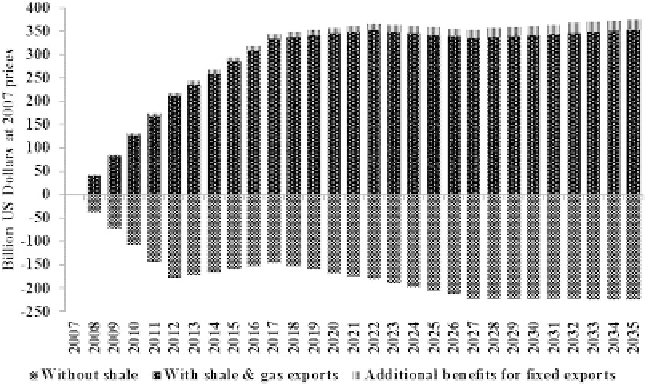Environmental Engineering Reference
In-Depth Information
Figure 4 Annual welfare gains due to expansion in shale oil and gas.
about
$178 billion by 2012. Then, since US conventional oil production is
expected to increase during 2012-17, the magnitude of welfare losses drops
slightly by 2017. After that, the magnitude of welfare losses grows until 2027
and then remains at around
$222 per year until 2035. In general, with no
expansion in shale resources, the overall cumulative welfare losses during
the time period of 2007-35 would be about $4957 billion.
On the other hand, with expansion in shale resources, US welfare in-
creases rapidly during the first two time slices of 2007-12 and 2012-17. The
magnitude of welfare gains reaches $355 billion in 2017 and remains at
around this figure until 2035. In this case, the overall cumulative welfare
gains during 2007-35 would be about $8298 billion. Restricting exports of
gas could add $372 billion to these cumulative gains. Hence, in general, the
expansion in shale resources improves US welfare by $13 256 billion (the
difference between overall welfare losses with no expansion in shale re-
sources and overall welfare gains with shale resources). This overall benefit
rises to $13 628 billion when we impose restrictions on exports of oil and
gas. Recall that the US annual GDP is around $15 trillion. These simulated
figures indicate that the shale oil and gas industries are expected to make
significant contributions to the future US economy.
The expansion in shale oil and gas affects the welfare of other countries as
well. As shown in Table 4, some regions will lose welfare and others will gain.
For example, Russia and other member countries of the former Soviet
Union, the Middle East and North Africa, Canada and South and Central
America, all of which export oil and gas, will be the main losers due to the
expansion in energy production in the US. The European Union and many
Asian countries will be big winners. These regions gain because of the re-
duction in global energy prices due to the expansion in US energy. They also
gain due to their trade of non-energy items with the US.

